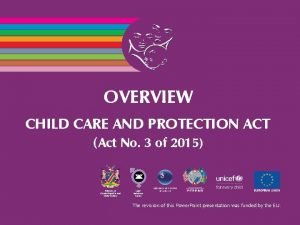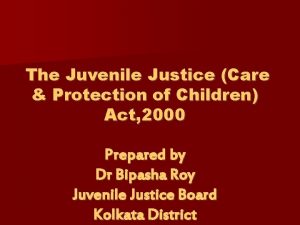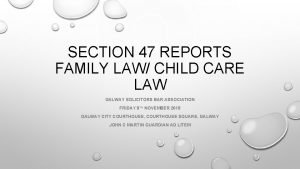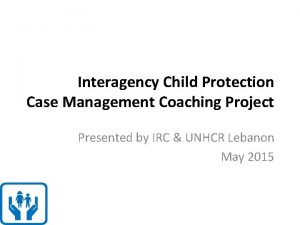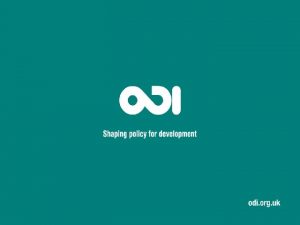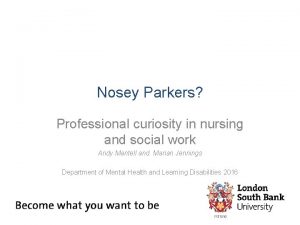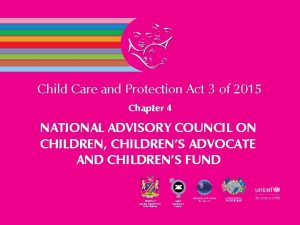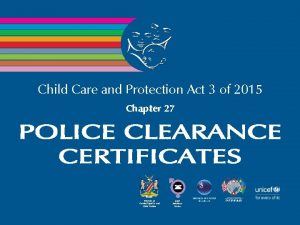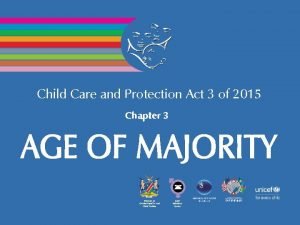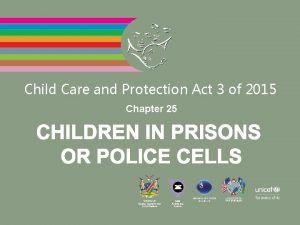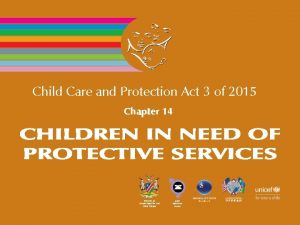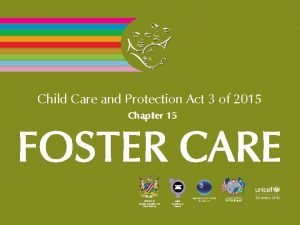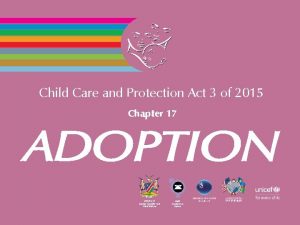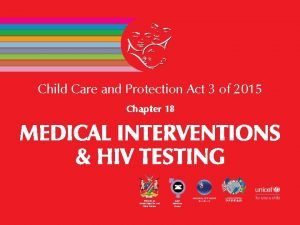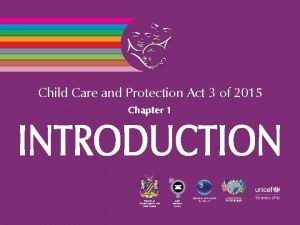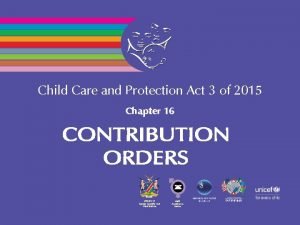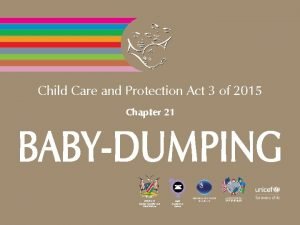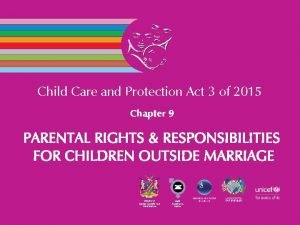Child Care and Protection Act 3 of 2015














- Slides: 14

Child Care and Protection Act 3 of 2015 Chapter 20 Ministry of Gender Equality and Child Welfare Legal Assistance Centre

Overview l The African Charter on the Rights and Welfare of the Child requires States to eliminate harmful social and cultural practices affecting children. The Child Care and Protection Act puts this duty into action. l One cultural practice the Act addresses ischild marriage, by setting the minimum age for civil and customary marriage at 18. l Other harmful social, cultural or religious practices may be prohibited after consultation with interested parties, including traditional leaders.

What practices are harmful? The Act does not define harmful social, cultural or religious practices. It states that a person may not subject a child to social, cultural and religious practices that aredetrimental to his or her well-being.

Constitutional & international framework • Namibian Constitution protects the right to practise any culture, language, tradition or religion, but only insofar as this does not impinge on the rights of others. • Namibian Constitution preserves customary law, but only to the extent that it does not conflict with any of the provisions of the Constitution or statutory law. • Namibian Constitution limits marriage to persons of “full age”, and allows it only where it takes place with the full consent of the intending spouses.

International framework Convention on the Rights of the Child: Addresses harmful traditional practices primarily in the context of the child’s right to health African Charter on the Rights and Welfare of the Child: Obligates States to eliminate any “custom, tradition, cultural or religious practice” that is detrimental to child’s welfare, dignity, health or life Convention on the Elimination of all Forms of Discrimination Against Women (CEDAW): Obligates States to modify social and cultural patterns based on sex stereotypes Protocol to the African Charter on Human and Peoples’ Rights on the Rights of Women in Africa: Addresses harmful practices that affect women and girls

Prohibition A person who subjects a child to social, cultural and religious practices which are detrimental to the child’s well-being commits a crime punishable by a fine of up to N$50 000 or imprisonment for up to 10 years, or both.

Child marriage • It a crime to give a child out in marriage or engagement if the child is below 18 OR if the child does not consent to the marriage or engagement. • Applies to civil, customary or religious marriages. • Penalty = fine of N$50 000 or imprisonment for 10 years or both.

Consent to marriage New Marriage Bill under consideration in 2019 would eliminate all possibility of marriage under age 18: NO EXCEPTIONS

Who must give parental consent? l If parents are married: both parents l If parents were never married: the parent who has guardianship l If parents are divorced: the parent who has guardianship (unless divorce order states otherwise)

Overruling refusal of consent A person who feels that parental consent to marry is being unreasonably withheld can approach the High Court to overrule the refusal to give consent.

Other harmful social, cultural or religious practices l Minister, after consultation with interested parties, including traditional leaders, may prohibit other practices, including sexual initiation, by regulation. l Regulations prohibiting harmful practices can impose fine of up to N$10 000 or imprisonment for up to 2 years or both.

Criteria for harmful practices The Act does not set any criteria for determining if a specific practice is detrimental to a child’s well-being, but some criteria have been suggested by the CEDAW Committee. l Practices grounded in discriminationon the basis of age, sex, gender, etc l Practices that deny dignity or integrity of the person l Traditional, re-emerging or emerging practices rooted in social norms that perpetuate male dominanceand inequality of women and children l Practices imposed on women and childrenby family members, community members or society at large

Are these practices harmful? l l l Initiation rites? Labial stretching to ready girls for marriage? Isolation of girls during menstruation? Sexual initiation of girls by male relatives? Scarification? Discrimination against children with albinism or disabilities? Circumcision of male babies? Beauty pageants? Ear piercing of children? Corporal punishment of children by their parents? Forcing children to adopt their parents’ religion? Intolerance of some sexual orientations / gender identities? Some practices may have both positive and negative aspects.

Need to review practices African Committee of Experts on the Rights and Welfare of the Child: “customs, traditions, cultural and religious practices should be kept under continuous review”, as they may become distorted over time so that practices which were once acceptable no longer function positively. ***
 Child care and protection act 3 of 2015
Child care and protection act 3 of 2015 Child care and protection
Child care and protection Child protection and toy safety act
Child protection and toy safety act Child protection reform amendment act 2017
Child protection reform amendment act 2017 Cncp and ccl
Cncp and ccl Handle information in care settings
Handle information in care settings Section 47 reports
Section 47 reports Safeguarding and child protection the essentials
Safeguarding and child protection the essentials Health care levels primary secondary tertiary
Health care levels primary secondary tertiary Courage child protection
Courage child protection Types of child protection
Types of child protection Child marriage definition
Child marriage definition Child protection case management tools
Child protection case management tools Types of child protection
Types of child protection Professional curiosity in nursing
Professional curiosity in nursing

